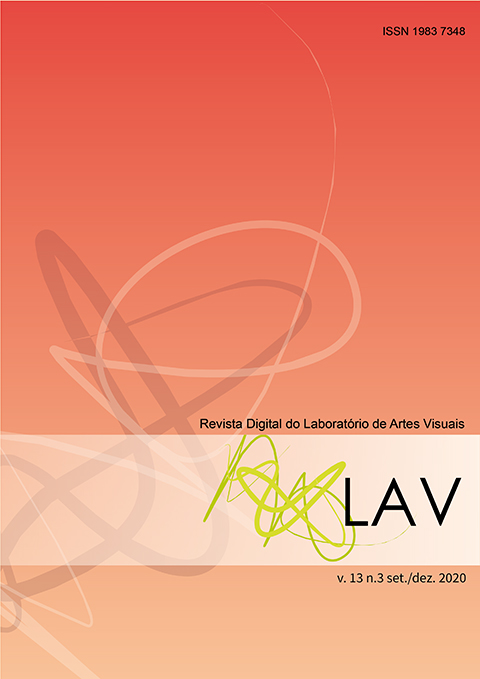Expositions of ‘degenerate’ art and music in nazi Germany: reflections on totalitarian aesthetics and education
DOI:
https://doi.org/10.5902/1983734848141Keywords:
Degenerate art, Nazism, education, totalitarian aesthetics, Critical Theory of Society.Abstract
During the Third Reich (1933-1945), Nazi intellectuals conceived the music and the plastic arts as elements that form moral values, which can corrupt education and compromise political and social life. From the theoretical formulation of a totalitarian aesthetic, every art considered "degenerate" was censored and exposed as an example of immorality. Inaugurated in 1937, the exhibitions Entartete Kunst (Degenerate Art) and Entartete Musik (Degenerate Music) brought to the city of Munich works related to modernism, Bolshevism, as well as the artistic production of black people, Jews and Soviets. Based on a bibliographic research supported by the Critical Theory of Society, this article analyzes the content of those exhibitions, demonstrating the pedagogical role of art in the formation of the moral values of German society from the perspective of Nazi intellectuals.Downloads
References
ADORNO, T. W. A arte é alegre? In: RAMOS-DE-OLIVEIRA, N.; ZUIN, A. Á. S.; PUCCI, B.(Orgs.). Teoria crítica, estética educação. Campinas: Unimep, 2001.
ADORNO, T.W. Educação e Emancipação. Tradução Wolfgang Leo Maar. 2ª ed. Rio de Janeiro/São Paulo: Editora Paz e Terra S.A. 2000.
ADORNO, T.W. Teoria da Semiformação. In: PUCCI, ZUIN E LASTÓRIA (orgs). Teoria Crítica e inconformismo: novas perspectivas de pesquisa. Campinas-SP: Autores Associados, 2010. pp.7-40.
ADORNO, T.W. Textos escolhidos. Coleção Os pensadores. São Paulo: Nova Cultural, 1999.
BARTOLETTI, S.C. Juventude hitlerista: a história dos meninos e das meninas nazistas e a dos que resistiram; tradução de Beatriz Horta. Rio de Janeiro: Relume-Dumará, 2006.
BRONNER, S.E. Da Teoria Crítica e seus teóricos; tradução Tomás R. Bueno, Cristina Meneguelo. Campinas, SP: Papirus, 1997.
BURLEIGH, N. Mirage: Napoleon's Scientists and the Unveiling of Egypt. 1ª ed. New York: Harper Perennial, 2007.
CAMBI, F. História da Pedagogia; tradução de Álvaro Lorencini. São Paulo: Fundação Editora da Unesp (FEU), 1999.
COHEN, P. Undergångens arkitektur (Arquitetura da Destruição); narração Bruno Ganz (documentário, cor, 119 min.). Suécia, 1989.
CONTIER. A.D. Arte e Estado. Música e Poder na Alemanha dos anos 30. Revista Brasileira de História. São Paulo, v8n°15 pp107-122. set/fev 1988.
CUNO, J. Who Owns Antiquity? Museums and the Battle over Our Ancient Heritage. New Jersey: Princeton University Press, 2008.
DHM. Deutsches History Museum. Disponível em https://www.dhm.de/lemo/kapitel/ns-regime/kunst-und-kultur/entartete-kunst.html . Acesso em 13/07/2020.
ELIAS, N. Os alemães: a luta pelo poder e a evolução do habitus nos séculos XIX e XX. Tradução de Álvaro Cabral. Rio de Janeiro: Jorge Zahar Ed., 1997.
FERREIRA, C.S. Restituição dos bens culturais retirados no contexto do colonialismo: instrumento de desenvolvimento e de diálogo intercultural. Edições Universitárias Lusófonas. Cadernos de Sociomuseologia, v.47 n°3, pp.109-129, junho de 2014.
FRIEDLANDER, H. The origins of Nazi genocide. From euthanasia to the Final Solition. Chapel Hill and London: University of North Carolina Press, 1995.
GHDI. Germany History Documents and Images. Disponível em http://germanhistorydocs.ghi-dc.org/sub_image.cfm?image_id=2082 . Acesso em 13/07/2020.
GOMBRICH, E.H. A História da arte. 1ª ed. Rio de Janeiro: LTC, 2013.
GOMES, L.R. Teoria Crítica, Educação e política. In PUCCI, B.; A.S.ZUIN; L.A.C.N.LASTÓRIA (orgs). Teoria crítica e inconformismo: novas perspectivas de pesquisa. Campinas-SP: Autores Associados, 2010. pp. 197-215.
GRUSHKA, A. Frieza burguesa e educação: a frieza como mal-estar moral da cultura burguesa na educação. Campinas, SP: Autores Associados, 2014.
HITLER, A. Minha Luta (Mein Kampf); tradução Klaus von Punchen. 1ª Edição Histórica. São Paulo: Centauro, 2016.
HOBSBAWM, E.J. A Era dos Extremos: o breve século XX (1914-1991); tradução Marcos Santarrita; revisão técnica Maria Célia Paoli. São Paulo: Companhia das Letras, 1995.
HORKHEIMER, M. e ADORNO, T.W. Dialética do Esclarecimento: fragmentos filosóficos. Tradução Guido Antônio de Almeida. Rio de Janeiro: Jorge Zahar Ed., 1985.
KNUTH, R. Libricide: the regime-sponsored destruction of books and librarys in the twentieth century. Wesport: Praeger Publishers, 2003.
KRACAUER, S. De Cagliari a Hitler. Historia Psicológica del cine alemán. Traducción de Hector Grossi. Barcelona: Ediciones Paidós, 1985.
MIRANDA, S. Arte Degenerada: Obras inimigas. Revista Aventuras na História. São Paulo, n°47, p.36, julho de 2007.
NOBRE, M. (org). Curso livre de Teoria Crítica. 3ª ed. Campinas, SP: Papirus, 2013.
PUCCI, B. Teoria Crítica e Educação: A formação cultural na Escola de Frankfurt. 2ª ed. São Paulo: EDUFSCar, 1995.
PUCCI, B.; A.S.ZUIN; L.A.C.N.LASTÓRIA (orgs). Teoria crítica e inconformismo: novas perspectivas de pesquisa. Campinas-SP: Autores Associados, 2010.
PUCCI, B.; COSTA, B.C.G; DURÃO, F.A. (orgs). Teoria crítica e crises: reflexões sobre cultura, estética e educação. Campinas-SP: Autores Associados, 2012.
PUCCI, B.; ZUIN, A.; LASTÓRIA, L. 10 lições sobre Adorno. 1ª ed. São Paulo: Editora Vozes, 2016.
RIEFENSTAHL, L. Triumph des Willens (Triunfo da Vontade); (documentário, preto e branco, 114 min.) Alemanha, 1935.
SHIRER, W.L. The Rise and Fall of the Third Reich. New York: Simon & Schuster, 1990.
UNESCO. Convention for the Protection of Cultural Property in the Event of Armed Conflict with Regulations for the Execution of the Convention 1954. HAIA: UNESCO, 1999. Disponível em http://portal.unesco.org/en/ev.php-URL_ID=13637&URL_DO=DO_TOPIC&URL_SECTION=201.html . Acesso em 13/07/2020.
USHMM. United States Holocaust Memorial Museum. Disponível em https://www.ushmm.org/information/exhibitions/online-features/collections-highlights/julien-bryan/nazi-germany-1937/1937-munich-exhibition-of-degenerate-art Acesso em 13/07/2020.
ZUIN, A.S.; LASTÓRIA, L.A.C.N.; GOMES, L.R. (orgs). Teoria crítica e formação cultural: aspectos filosóficos e sociopolíticos. Campinas-SP: Autores Associados, 2012.






